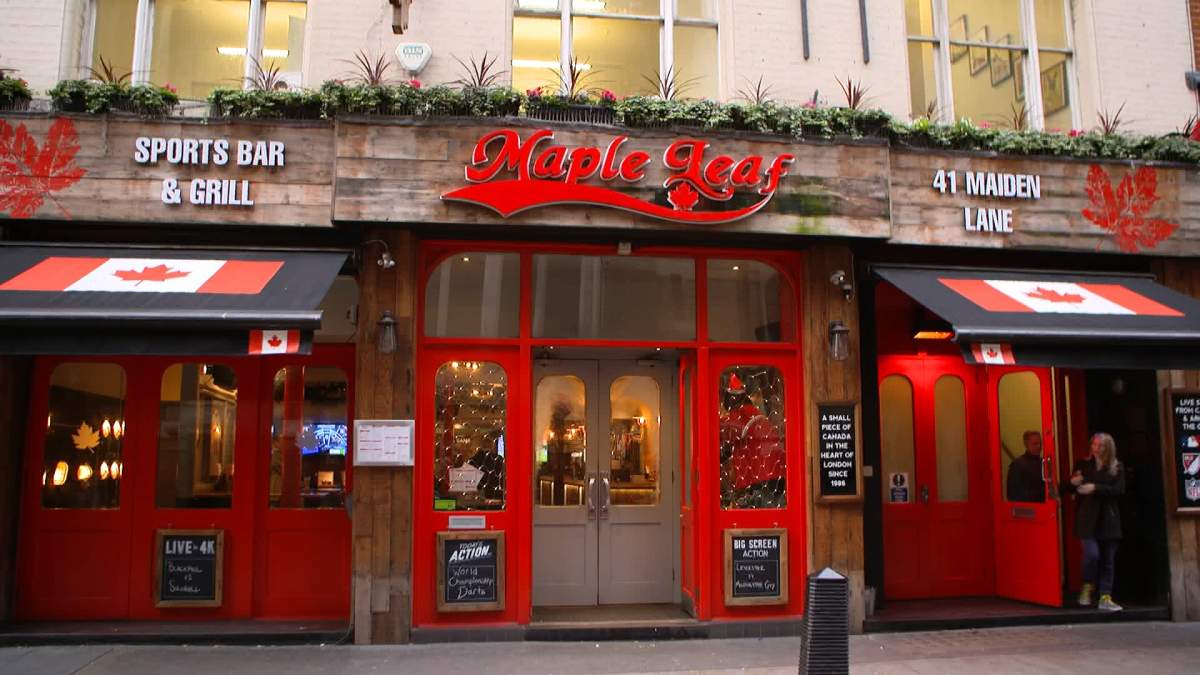With a stalemate in British Parliament and fewer than 100 days before the United Kingdom is scheduled to leave the European Union, Canadian businesses in Britain are now scrambling to prepare for the growing possibility of a so-called ‘no-deal’ Brexit — if the UK leaves the EU without first agreeing to the terms of the divorce.

“No one really knows what’s going to happen,” said Zach Larochelle.
The Chilliwack, B.C. native is the general manager of the Maple Leaf, a Canadian-themed sports bar in London. The pub serves Canadian cuisine, but since any European Union citizen is permitted to live and work in another EU country without a visa, many of their supplies and their staff come from Europe.
“We have a lot of people who work here who were born and raised in Canada,” Larochelle said. “But through their parents, they have an Italian passport or a Dutch passport, for example, which allows them to work in the UK.
“Now people are wondering if that’s going to change.”
It’s highly unlikely that the 3.5 million EU citizens already living and working in the UK would be forced to leave in the event of a no-deal Brexit. But many businesses like the Maple Leaf, which relies on imports from the EU, are now bracing for a much higher cost of doing business in Britain.

Get daily National news
“The Canadian companies that have invested in the UK to service the broader EU market are the companies that really need to have contingency options in terms of increased costs,” said Stephen Wilhelm, a regional vice president with Export Development Canada.
There are currently around 600 Canadian companies operating in the UK and most also do business with the EU, according to Robert Brant, a corporate finance lawyer who has spent 20 years advising Canadian businesses in Britain. “The UK is a great gateway to Europe and that’s been one of the attractions,” Brant said. “Most of the Canadian subsidiaries have come to the UK because of its access to a much bigger market.”
But if the UK and the EU can’t agree on a withdrawal deal by March 29, 2019, they’re expected to revert to the World Trade Organization’s rules.
WATCH: With 100 days left until Brexit deadline, what could happen when it’s time to leave the EU?

In that scenario, any Canadian company looking to import goods from the EU into the UK would suddenly be forced to pay tariffs. Bombardier’s UK plant in Belfast, for example, receives hundreds of components from the EU. The Canadian aerospace manufacturer has warned a no-deal Brexit would cost it more than $50 million.
“In a no-deal worst case scenario, you can’t get people, you can’t get products. And so we are seeing clients now stockpiling and preparing the best they can,” Brant explained.
In addition to Canadian companies based in the UK, a no-deal Brexit also threatens Canada’s broader ability to trade with Britain. After March 29, the UK would lose its stake in EU free trade agreements with dozens of countries, including Canada.
The United Kingdom is by far Canada’s largest European trading partner. Two-way merchandise trade reached $26.51 billion in 2017 and is forecast to grow as a direct result of CETA, Canada’s recently-signed free trade agreement with the EU that removed 98 per cent of tariffs. As Europe’s second-largest economy, the UK is naturally a significant stakeholder in CETA. And Canadian and British officials are now working behind the scenes to ensure the Canada-UK trade relationship continues as seamlessly as possible in the event of a no-deal Brexit.
WATCH: May says vote on Brexit deal will take place in January

“If there’s not a withdrawal agreement, then there are currently discussions between the Canadian government and the UK to bring in a provisional trade agreement, which would largely be mirrored on CETA, to prevent any disruptions in trade between our two countries,” Wilhelm explained.
But others are skeptical that the UK and Canada can strike a replacement deal before March 29. Armand de Mestral, an expert in international trade law at McGill University, recently published a report in collaboration with Cambridge University on the post-Brexit Canada-UK trade relationship.
“If you want to give the UK full CETA rights after it leaves the EU, that requires some kind of trade bill, and that has to go through parliament,” de Mestral explained.
And that’s easier said than done. CETA took seven years to negotiate. The EU agreed, for example, to accept 40,000 tonnes of Canadian beef. To apply CETA rules to a no-deal Brexit scenario, de Mestral said, all parties — including the EU — would need to agree what percentage of that Canadian beef export would go to the UK.
“If you don’t have an agreement on quotas, then the exports will be charged a tariff at the higher quota rate,” he explained.
British Prime Minister Theresa May will submit her proposed Brexit deal to a vote of British Parliament in mid-January. Her proposal includes a transition phase that would see the UK remain part of the EU’s single market and, by extension, CETA for at least two more years.
But most expect May’s Brexit deal to suffer a resounding defeat.
“If that vote goes down in flames, then we have less than two and half months to put everything together. Can they deliver a full scale Canada-UK trade deal, replicating CETA in all of its 500-pages of detail? I personally doubt it,” de Mestral said.
“They may able to put through a stop-gap piece of legislation saying the UK continues to have CETA rights and leave to a later date the negotiation of a full CETA agreement. But it’s very, very tight.”












Comments
Want to discuss? Please read our Commenting Policy first.